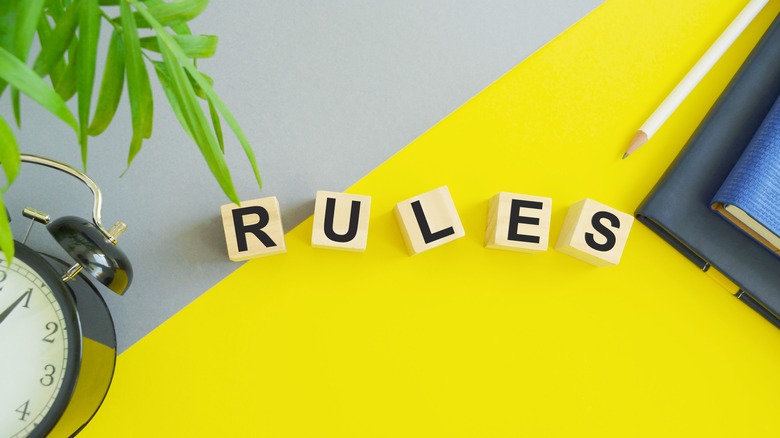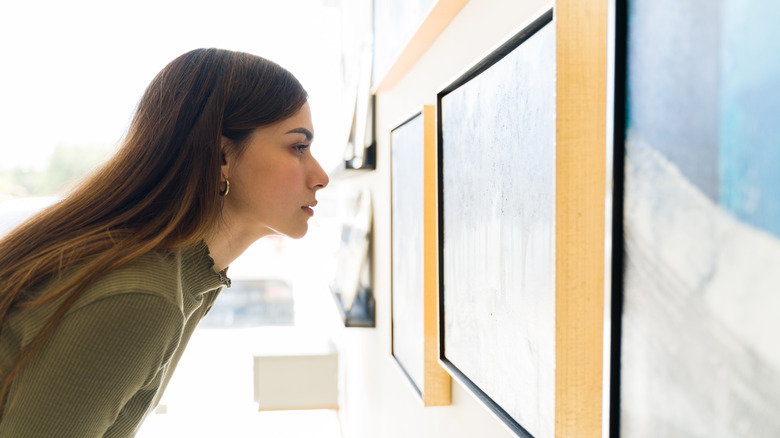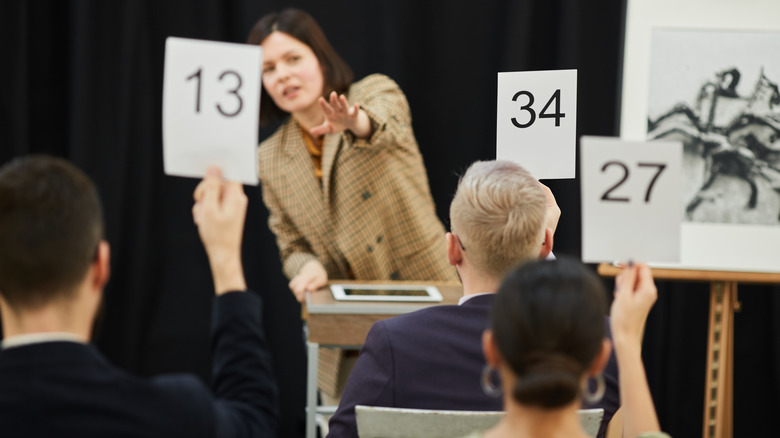10 Tips For Buying Art For Your Home At An Estate Auction
There are various places where you can find affordable art for your home and that includes estate sales. Along with possible practical items for the home and potential furniture, art of all kinds is often found among other secondhand treasures being sold at estate auctions.
While the art you'll find at an estate sale comes from a personal collection, the process behind it being prepared for an auction tends to be the same as other kinds of auctions. Of course, there are a few steps to be taken, according to Mountain Living. If someone decides to go with a professional auction house — as opposed to conducting the auction themselves — they must first provide a list of the artwork as well as photographs of each piece. They also need to note artist names, sizes of the pieces, and any information they have regarding the work. The auction house will then consider the art while also conducting its own research. If they're interested, they'll make arrangements with the seller. From there, the art will be transported to the auction house and prepared for sale.
It's at the point where you can come in and start your own process, which can lead to nabbing an incredible piece of art. In fact, you can get the journey started before the auction even begins. All you need to do is check out the following savvy tips for buying art for your home at an estate auction.
1. Plan ahead
Before you check out estate auctions, create a list of what you want and need. Figure out if there are spots in your home that could use artwork and determine how big the piece should be. Decide if you're looking for a painting, sculpture, or pottery, as well as a specific style. This can ensure you get exactly what you're looking for. Granted, if something unexpected pops up that you love, you may want to snap it up and figure out where to put it later in order to avoid potential regret if you don't buy it.
2. Look at listings
Some local newspapers may let you know when estate auctions are taking place; however, most listings can also be found online. In fact, some estate auctions happen online. Whatever kind of sale you're interested in, it's a good idea to check out the listings beforehand. Take a peek at what kind of art is available and make a note if there's anything you want to bid on. If you find items that pique your interest, then you can plan on attending the auction and can also be prepared to bid when the pieces you want pop up.
3. Know etiquette and rules
Whether you're attending an estate auction in a home or at an auction house, you should be aware of the fact that there will be rules to follow, which will be established before the sale starts. They will unusually involve registering as a bidder beforehand and getting a paddle or number if necessary, viewing the pieces of art during a set time, and entering bids in a certain way. If you're unsure of any potential steps or rules, then you can merely ask whoever might be in charge or someone who's helping out.
4. Arrive early
While it's clearly polite to show up to any event on time, there's a good reason why you should show up to an estate auction as early as possible. As for when an auction will be held, there's often a period when you can get an in-person look at the items that will be going up for sale. It's a good idea to plan to arrive as soon as this viewing period begins to give you plenty of time to register, check out everything that will be sold, and grab an ideal spot for bidding.
5. Gather information
You may have been able to identify pieces that you want to bid on ahead of time. which means that you can also do some prior research. At the same time, you'll still want to gather as much information as possible while you're at the auction. Are any documents included with the piece? Can you spot a signature or gallery mark? Is there any provenance or family history that's been provided? Any of this can be helpful when it comes to knowing what artwork you might end up with and how much you might want to spend.
6. Be prepared for quick research
There's a chance that there's not much information available about the art that you come across during an estate auction. That's why you should be prepared to do some quick on-the-spot research. While viewing the art, keep your phone in-hand and Google ready. Look up any names you find or titles you come across. If allowed, you might also be able to take a picture of the art and upload it to an app to attempt to identify it or at least give you an idea of the style or medium.
7. Stick to your budget
Although you might be able to get some great deals at estate auctions, the bidding process can also become exciting and even heated. In that case, you'll want to know how much you're willing to spend before you go so that you don't get too swept up in the action. Along with coming up with an overall art-buying budget, you should try to determine the maximum amount you're willing and able to pay for each piece and be sure to stop bidding if the price goes above your limit.
8. Don't be shy
When it comes to buying items for your home at an estate auction, you may miss out on the treasures that you have your eyes on if you're not willing to be bold. That can especially be true if you're buying art. This isn't a time to worry about what others might think of your aesthetic preferences. If you see something you want, then be sure to proudly bid on it and do so aggressively, if necessary. Also, don't be shy about buying multiple pieces or entire boxes of art if they've piqued your interest.
9. Bring transportation
Hopefully, at the end of the estate auction, you'll have scored some fabulous deals on art. Getting your new possessions home shouldn't be much of an issue if you don't live far away and are easily able to carry your purchases. On the other hand, if you suspect you'll need to get a large art piece or multiple pieces home a fair distance away, then you'll want to be sure to have the proper transportation so that you won't have any issues getting your new artworks back to wherever it is that you call home.
10. Be respectful
When you buy art at an estate auction, it's obviously not the same thing as shopping at a store. Remember that you might be entering someone's home if the sale is taking place in a residence and to act accordingly. Even if the sale is happening at an auction house, though, you should keep in mind that the items being sold were once someone's personal belongings — perhaps being sold due to a death, divorce, or another change in circumstances — and be respectful. That way, you'll be able to feel good about giving the art that you buy a new life.










